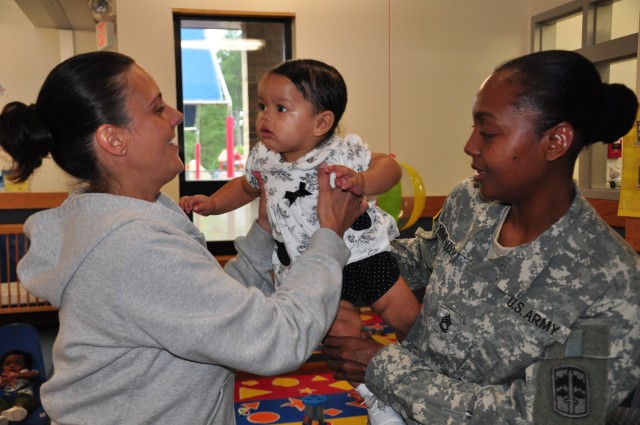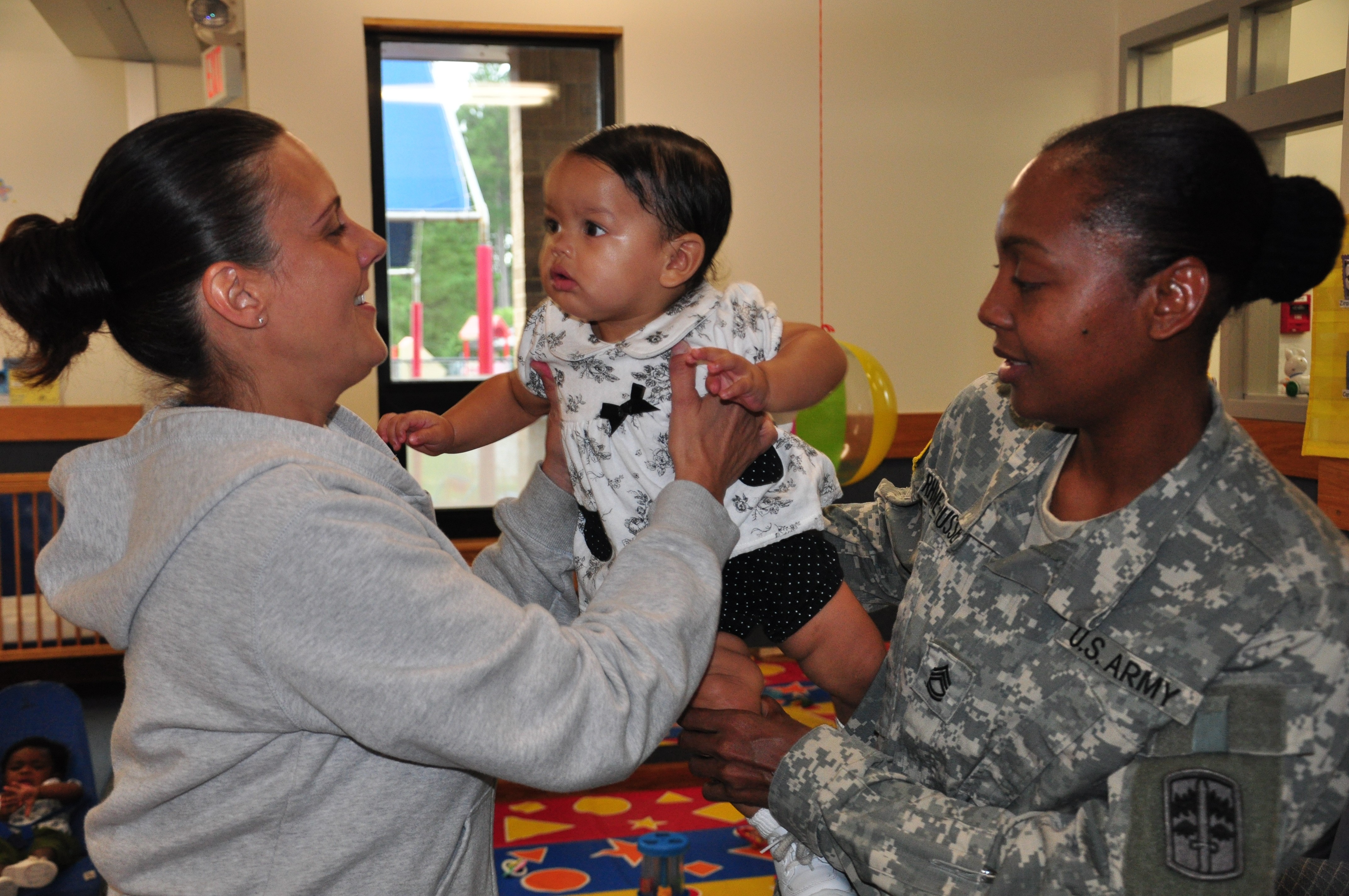
FORT JACKSON, S.C. -- As Sgt. 1st Class Erika Rhine-Russell kisses her daughter goodbye and places her in Lisa Zaprzalka's arms, she is comforted knowing her baby girl is in good hands.
While Rhine-Russell heads to work at the 120th Adjutant General Battalion (Reception), her daughter will stay with Zaprzalka, a program assistant in an infant room at Fort Jackson's Scales Avenue Child Development Center, for an eight-hour day.
That's been their routine every Monday through Friday since her daughter was six weeks old.
Going back to work after maternity leave was a heart-wrenching task for Rhine-Russell, but the convenience, quality and low costs of on-post child care, makes the situation easier for the single mom to bear.
"It's more convenient for me to bring her here because it's close to my work and if I ever need to come get her, it would be easier (than off post)," Rhine-Russell said. "I also like that they have cameras in the rooms and they are a little less expensive than off-post day cares."
During the next few weeks, Rhine-Russell, will find out if she will get even more of a break as the Army modifies its child care fees.
As mandated by changes in the Department of Defense's updated Child Care Fee Policy, the Army will begin adjusting fees Oct. 1 for patrons of on-post child care.
Some Total Family Income categories will expand, allowing more families to qualify at lower levels, while three new categories will be added at the top, raising the income cap from $70,001 to $125,001. So instead of six TFI categories, there will now be nine.
Rose Edmond, division chief of Fort Jackson's Child, Youth & School Services, said the fee changes are the first since 2004 and come as a result of a DoD study that found fees were not keeping up with the costs of child care or for increases in inflation and family incomes.
"Basically, at the installation level, what will happen for people who are in full-day and part-time programs is that throughout the next two weeks we will be assessing everybody's income," Edmond said. "By the first of September, every family in these programs will receive a letter explaining the change in fees."
Edmond said the Army's goal is to have one standard fee in each category across the military by 2012-13, allowing for consistency from installation to installation.
"Prior to this new change, Army installations were given a range, and the garrison commander selected the fee amounts," Edmond said. "But now we are moving to one standard."
The fee changes will also include the following modifications:
- The multiple child reduction will increase from 10 to 15 percent, which means that for a parent with two children in the programs, the second child's fees are 15 percent less.
- The multiple child reduction fee for hourly care will go away.
- Late payment fees have not changed, but the number of days that you have to pay without incurring a late fee will increase from three to five business days.
- Head youth sports coaches will be able to enroll their children at no cost in any team sports occurring in the same season.
- Assistant youth sports coaches will be able to enroll their first child free and additional children at a 15 percent reduction.
What will remain the same is free registration for all child-care programs, and all Army Family Covenant fee reductions, including respite care for deployed families, a 20 percent discount for deployed families, and the $2 hourly care fee, after respite care is used.
Families who will be negatively impacted by the changes can apply to use the hardship provision by visiting the Army Community Service's financial planning section where their fees will be assessed and ACS will send a recommendation back to CYSS, Edmond said.
"(On-post child care) is still a good deal for your money," Edmond said. "Every family is still subsidized. Even at category nine (customers) do not pay the full costs for taking care of a child.
"Often times, our fees are taken out monthly, and people divide (the fees) by four (weeks), forgetting that there are 52 weeks in a year," Edmond said. "They think they might get a break when they go off post, but most times they are not, particularly because they don't get leave credit off post either."
Fort Jackson child care centers offer care ranging from 4 a.m. until 9 p.m., Edmond said. And full-time fees are the same per category, so that parents who have a child in full-time care are not paying any more for a child who stays from 4:30 to 8 p.m. than parents who have a child stay in care from 6 a.m. to 6 p.m.
Child care room ratios are one care provider to every four children, Edmond said. Most child care centers off post have ratios of 1:6.
All of Fort Jackson's child care centers are also accredited by the National Association for the Education of Young Children, Edmond said, which means the care providers adhere to quality measures dedicated to improving the well-being, and educational and developmental services of children.
In the next few weeks, Edmond will be creating a fee chart comparing on-post fees with those charged at child care facilities in the local community. The chart will include comparison of both accredited and non-accredited centers.
Col. James Love, garrison commander, said he believes Fort Jackson families will continue to have access to some of the best child and youth programs found anywhere in the world.
"These programs are an integral component of our community programs," Love said. "This will continue to be a great value for our Soldiers and their families."

Social Sharing